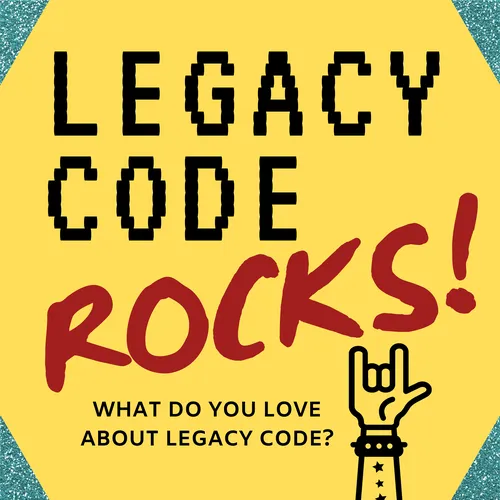
Legacy Code Rocks
Legacy Code Rocks explores the world of modernizing existing software applications. Hosts Andrea Goulet and M. Scott Ford of Corgibytes are out to change the way you think about legacy code.
If you’re like a lot of people, when you hear the words “legacy code” it conjures up images of big mainframes and archaic punch card machines. While that’s true — it only tells a small part of the story. The truth is, the code you leave behind is your legacy, so let's make it a good one.
- Update frequency
- every 13 days
- Average duration
- 43 minutes
- Episodes
- 162
- Years Active
- 2016 - 2024

Servicing Technical Debt with Dave Mangot
There is some disconnect between business people and engineers when talking about technical debt. While engineers understand the metaphor as a credit card debt that has to be paid off entirely and as…

Code Review with Michaela Greiler
How to ensure that your code review practices are not just an expensive bottleneck in your team’s productivity but its ultimate superpower?
Today we talk with Michaela Greiler, a Head of Research at …

Carrying Cost with Avdi Grimm
What does it mean to build a cost-free feature in the software, and are cost-free features even possible?
Today we talk with Avdi Grimm. Avdi is a software developer with more than twenty years of ex…

Process Improvement with Stefanni Brasil
Every once in a while, it is wise to stop for a second and think about why we do things in a specific way and whether we need to change something. This is where rethinking processes kick in.
Today w…

Building Durable Software with Ashu Chatterji
There is an eternal dilemma among software developers - should we try our best to predict the future and build it into our code, or should we just plan for frequent iterations?
Today we talk with As…

Software Design with John Ousterhout
To build anew or to rebuild? Many developers have a knee-jerk reaction to start building existing software systems from scratch because they think that is the easiest way forward.
Today, we talk wit…

Elm, Roc, and Rust with Richard Feldman
Working on legacy code is never easy, but some programming languages make it more enjoyable.
Today, we talk with Richard Feldman, the creator of the Roc programming language, the author of Elm in Ac…

Refactoring in Product Teams with Andreas Creten
Product teams are scared of technical debt and refactoring. They press on to make something new, not to question what they have already created. However, the urgency to deliver new products carries t…

STEM and Cooking with Kimberly Fox
How can cooking help you have a better team?
Today, we talk with Kimberly Fox. Kimberly leads virtual and in-person cooking classes and is a recipe developer and writer for her blog, From Market to T…

Python with Michael Kennedy
In this episode, we are talking with Michael Kennedy, Python expert and the founder and host of two podcasts - Talk Python To Me and Python Bytes. He also runs Talk Python Training which provides onl…

Software Security with Rob Dickinson
Software security has become one of the most important topics affecting the lives of millions of people.
Today we talk with Rob Dickinson, a co-founder, and CTO of Resurface Labs, a data-driven API …

Evolving Software with João Rosa
We design software within a particular context. When that context changes, so should the software. But change is often difficult.
Today we talk with João Rosa, an independent consultant focused on h…

Legacy JavaScript with David Neal
If you try to fix broken things in JavaScript, you will probably break the Internet because the entire Internet expects those "mistakes" to be there. Today we talk with David Neal, a family man, geek…

Observability with Hunter Madison
Legacy becomes legacy only when the memory of how the system works is gone. This is where observability kicks in.
Today we talk with Hunter Madison. Hunter is the cloud architect for Instana, an ob…

Open-Source Software with Naomi Ceder
The world as we know it wouldn't exist without open-source software. We have learned to rely and depend on these free products that magically get maintained and updated by communities of volunteers. …

Agile Practices in Legacy Code Mending with Michael Toppa
Agile has become the mainstream in software engineering, and agile principles should feel natural to legacy code menders.
Today we talk with Michael Toppa, the Senior Engineering manager at FastRuby…

Rector with Matthias Noback
Imagine if you could refactor legacy code with a single CLI command? Well, you can, at least if you are working with PHP.
Today we talk with Matthias Noback, a long-time web developer and the author…

From Java to Kotlin with Duncan McGregor and Nat Pryce
There is a lot of buzz around Kotlin, a new Java-based programming language that many think might eventually replace Java. But is all this talk justified, and are the predictions of replacement reali…

Code Testing With Melanie Frank
We all want our code to be stable and resilient to future challenges. But we need to strike the right balance between testing our systems and the cost of failure. This is much harder to achieve than …

Checks and Balances in Coding with Samuel Taggart
We all strive to write an ideal code - easily readable, functional, and clean. We use many tools to achieve this. However, we often forget why we need our code to be tidy.
Today we are talking with …